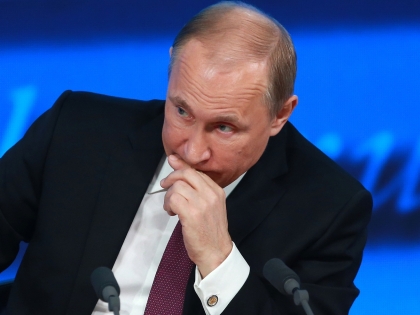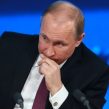
How Long Can Putin Continue Doing Nothing?
Publication: Eurasia Daily Monitor Volume: 12 Issue: 140
By:

Russia had all but disappeared from the international arena in the last couple of weeks, particularly following the July 14 signing of the international de-nuclearization deal reached with Iran. Indeed, as long as the pause in the Ukraine war holds, Moscow’s opinions on international relations attract little attention because its ability to influence key global matters has shrunk to irrelevance. But much more unusually, domestic politics in Russia have essentially gone silent as well. And this is despite an obvious need for the Russian government to make difficult decisions on economic and social matters to stem the steadily deteriorating situation in the country. President Vladimir Putin has not disappeared from the public eye, as he did in March 2015 (see EDM, March 16); he reportedly presided over meetings of his government and the Security Council last week. The government meeting considered, in the best Soviet tradition, the prospects for this year’s harvest, and the Security Council dealt with safety on Russia’s legendarily bad roads (Kremlin.ru, July 25). This imitation of leadership does not affect Putin’s approval ratings, which remain above 85 percent, but it is uncertain whether he is actually concerned with the situation in the country (Levada.ru, July 23).
President Putin is clearly unhappy about Moscow’s sharply diminished international profile, but the attempt to boost it by hosting the back-to-back BRICS and Shanghai Cooperation Organization (SCO) summits in Ufa, two weeks ago, yielded few dividends (Kommersant, July 9; see EDM, July 14). Putin may fancy himself a leader of an anti-American world, but India or Brazil have little time for such fantasies, while China is deeply worried about the health of its economy and has barely noticed that its trade with Russia decreased by about a third since last year (Novye Izvestiya, July 14). Russia used to be an important player in the convoluted mismanagement of the Syrian conflict, but presently Turkey is turning to military means without asking the Kremlin’s opinion, despite the allegedly cordial personal relations between Putin and President Recep Tayyip Erdoğan (Newsru.com, July 25). Previously, Russian energy sales never failed to boost Moscow’s regional importance, particularly in the European energy market. But now the European Union firmly opposes plans for new “corridors” for Russian natural gas, and China also shows scant interest in constructing the long-discussed pipelines (Kommersant-FM, July 16; Vedomosti, July 22).
Putin cannot fail to see that Russia’s stagnant economy undercuts his ambitions for a place of prominence among the “emerging powers”—which may be prone to entertaining ideas about dismantling US “hegemony,” but always prioritize the goal of achieving investment-driven economic dynamism. Few investors are convinced by Putin’s denials of a Russian crisis and promises of inevitable return to strong growth. Nonetheless, the government has to stick to these guidelines and so keeps trimming budget expenditures while lacking any coherent anti-crisis policy (Forbes.ru, July 22). Official statistics, meanwhile, have registered a 4.7 percent decline in GDP in the second quarter, compared with the same period in 2014; and the gentle slide in the oil price pushes the Russian currency down toward 60 rubles per US dollar (RBC, July 22). External borrowing remains severely restricted, and that converts capital flight—amounting to $52.5 billion since the start of the year—into an even larger disaster for domestic investment (Novaya Gazeta, July 20). The accumulating fall in real incomes combines with cuts in social programs, while Finance Minister Anton Siluanov estimates that although inflation will reach 15–16 percent this year, pensions can only be indexed by 5 percent (Polit.ru, July 25).
The Kremlin cannot really know when this squeeze on the middle class and the impoverishment of pensioners may reach a critical mass of discontent. Seeking to prevent an explosion of protests, Putin’s political “technologists” have moved up the date for State Duma elections to September 2016, which should provide a distraction from the sinking feeling of recession (Slon.ru, July 18). The liberal opposition is seeking to take advantage of that small opening of political space for launching several regional campaigns, for instance in Novosibirsk; while well-known Russian blogger Alexei Navalny stays relentlessly on his message of exposing high-level corruption (Navalny.com, July 25). Putin’s subordinates respond with the usual combination of suppression and fraud, but they also see the need to shut down the few remaining channels connecting Russia’s civil society with the West, including the work of the MacArthur Foundation (Moscow Echo, July 22). They may succeed in silencing liberal voices but cannot extinguish the discontent among the elites, who encounter both the over-concentration of decision making at the highest levels and the diminishing rationality of these decisions as President Putin, in the words of Mikhail Khodorkovsky, has lost control over even himself and departed to an alternate and religiously ego-centric reality (Sobesednik, July 23).
The army, an institution that is supposed to be a rock-solid pillar of Putin’s power, is showing dangerous cracks. Its exercises are meant to discourage European states from following the United States’ lead in deterring Russia. But a series of military plane crashes has underscored the wear and tear in the Air Force (Slon.ru, July 8). Sustained investments in rearmament should have proven Russia’s commitment to building up its military might, but the defense industry fails to deliver due to the combined impact of degradation, corruption and sanctions (Nezavisimoe Voennoe Obozrenie, July 24). The deployment of a 50,000-strong grouping of ground forces on the border with Ukraine is aimed at upholding the threat of invasion. However, these tired troops are growing demoralized by the official denials of the existence of Russian battalions inside the war zone (Gazeta.ru, July 22). The pause in hostilities may appear to be a smart political game, granting Putin an opportunity to hold regular telephone conferences with French President François Hollande and German Chancellor Angela Merkel, but the Russian army cannot maintain this high-readiness and offensively oriented posture through the entire summer (Kremlin.ru, July 23).
Putin has always preferred to postpone decisions until the last possible moment and to keep his lieutenants and international counterparts in the dark about his intentions. This summer, however, he is arguably wasting time and maneuvering himself into a corner, from which the only escape will be jumping into another spasm of hostilities in eastern Ukraine with the hope that a victory can cancel all other problems. The risks are frighteningly high, and Putin has avoided them for yet another week. But now August is approaching—a month that has traditionally brought Russia multiple disasters (see EDM, August 2, 2010; September 4, 2013).




